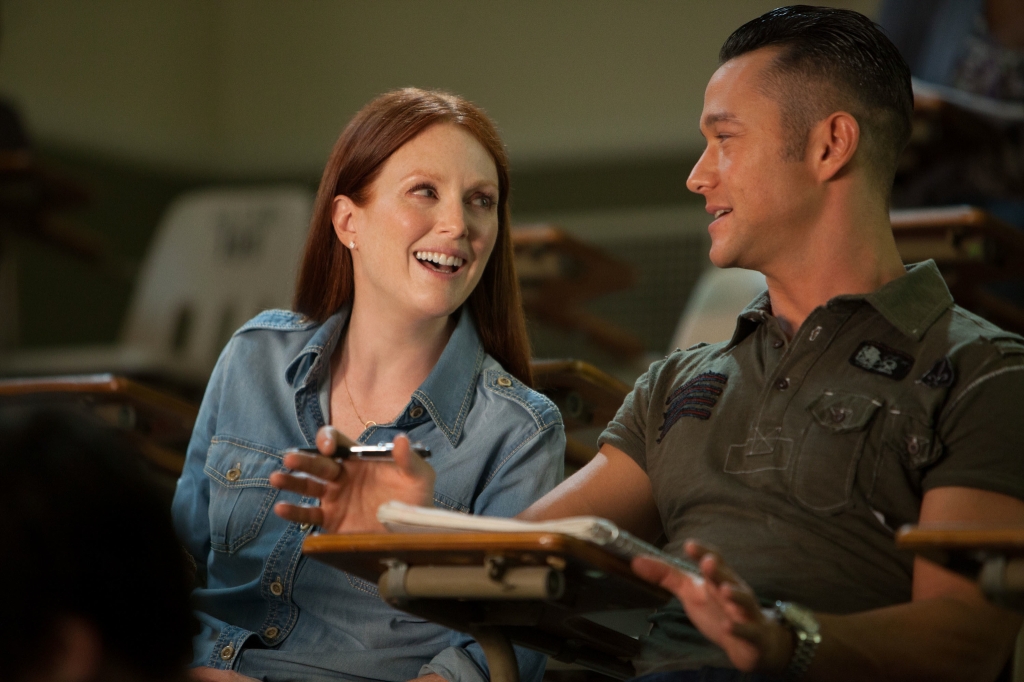
This review originally appeared as a guest post on 10 Years Ago: Films in Retrospective, a film site in which editor Marcus Gorman and various contributors revisit a movie on the week of its tenth anniversary. This retro review will be a bit more free-form, recappy, and profanity-laden than usual.
“What the fuck is this?”
Jon (Joseph Gordon-Levitt) and Esther (Julianne Moore), having a little chat in public about porn, as I’m about to do with you.
-“It’s actually pretty good. It was made by this Danish woman in the ’70s. It’s probably not what you’re used to looking at, but it’s pretty hot.”
“OK, look, I have a girlfriend, all right? So…”
-“I’m sorry, did you think I was hitting on you? Because I’m not… I thought you could use something better than that shit you’re watching on your phone. …am I right? If you have a girlfriend, why are you watching dirty movies?”
“You’re fuckin’ weird, you know that?”
-“I don’t entirely disagree, but you’re the one who’s gonna pretend you’re texting while you watch people pretend they’re fucking on your phone.”
“The shit I watch on here? They’re not pretending.”
-“Of course they are!”
All of the actual porn clips that appear in Don Jon are cropped narrowly enough to get the film an R rating, but its dialogue is unrestrained in both obscenity and depth when it comes to discussing all things pornographic and masturbatory. The 1994 Kevin Smith film Clerks settled the question of whether theatrical movies can discuss sexuality in such candid terms without getting an NC-17 rating, via an argument made by legendary creep and fascist-coddler Alan Dershowitz, spawning an all-timer for that “worst person you know made a great point” meme. But even as no-account New Jersey fuckboy Jon Martello, Jr. (Gordon-Levitt) explains in exquisite detail each step in his several-times-daily ritual of porn and self-pleasure (noting that the sound of his MacBook booting up gets him hard as a fucking rock), it still feels transgressive, because most candid discussion about sexuality is either preposterous (like the Fifty Shades trilogy) or in pursuit of a quick joke, never offering any real insight into sex where a brief, discomfited chuckle will do. And don’t get me wrong; Jon’s monologue is as hilarious as it is off-putting, but it never feels shallow. Jon describes masturbation like he’s ascending to Nirvana: “All the bullshit fades away…I don’t gotta say anything, I gotta do anything. I just fucking lose myself.” And that honest feeling of disconnection from his sexual partners seems worth exploring, whether or not his attitude about porn is cause or mere symptom.
This film was originally titled Don Jon’s Addiction and even premiered at Sundance under that title, and its creator’s acquiescence to the distributor’s title change makes me wonder just how confident he was about that “addiction” framing. JGL took to Facebook on that occasion and opined that he didn’t want people thinking the movie was about porn addiction and sex addiction, which is fair enough, and was probably about the limit of my understanding at the time. While Jon does try and fail to stop watching porn at his girlfriend’s behest, and another character questions whether he ever tries masturbating without it, nobody ever actually refers to this common behavior as an addiction, but rather treats it like what it is: A thing lots of people do, which can be done in excess. If you ask the professionals, the answer is pretty definitive – sex addiction does not appear as a distinct disorder in the DSM or its international equivalents. My own state’s coalition of sexual assault prevention programs (WSCAP) published a discussion guide to accompany Don Jon, and the word “addiction” does not appear in it even once. The consensus of scholarly and professional opinion is that sexuality is an ordinary human behavior expressed in a variety of ways, and attempting to isolate “sex addiction” as a distinct disorder serves to pathologize ordinary human behavior in a way that is both counterproductive to treatment for better-defined mental health conditions which might encourage illegal, disruptive, or upsetting sexual behavior, and also used as an excuse by policymakers and religious conservatives to isolate and pathologize ordinary expressions of sexual behavior that they deem undesirable and seek to repress as a means of cementing their political power. The entire LGBTQ community can tell you about that one.

So in the same way that Jon is forthcoming with the audience about what he gets out of his quotidian jerk sesh, so too is Don Jon honest about the limitations of its scope: Jon has very little at stake except his own maturity when it comes to sex and relationships, and consequently, the film plays less like a social document and more like a coming-of-age flick for horny twenty-something dudes who kinda need to get their shit together. And that is a fine and uncommon thing. It’s the rare indie gem, like Ben Lewin‘s The Sessions or Bill Condon‘s Kinsey, which discusses sexuality with any honesty, and even then, it’s usually in pursuit of some greater storytelling or biographical objective which justifies this odd moment in which we normie, God-fearing, uptight Americans find ourselves discussing sex when we’re all clearly too uncomfortable with the topic to do so. So I have to give some credit to JGL for crafting and portraying a character who is…essentially no one in particular except…a young American bro who likes watching porn between going to church to confess about it, and having sex with a parade of women he meets at The Club with The Boys, occasionally punctuated by a shouting dinner with his parents (Tony Danza and the late and excellent Glenne Headly) and his almost entirely taciturn sister (Brie Larson) about how his life is off-track and he’s a terrible football fan. That’s to say, JGL is putting himself forth through a fictional lens as a basic douchebag, and then putting that good-lookin fella on camera to confess to us, his friends beyond the fourth wall, that he doesn’t even really enjoy sex that much, and prefers the noble path of Onan and Pornhub. And lest we run the risk of liking him too much, he even troubles a one-two punch of suggesting that women can become hot enough to avoid having to give blowjobs and referring to men who enjoy performing the act of cunnilingus as “fucking crazy”.
Now, I’ll leave to the reader’s imagination whether and how often my tongue does a glissando – and it’s fair to say that men’s performative outrage at anyone questioning their watercress-grazing skills usually exceeds their true aptitude down south. But it’s also fair to say that Jon’s early and repeatedly-expressed desire to get head (as well as a variety of coital positions) without providing any reason why a partner would want to do so is presented to the audience as both an unlikable characteristic and a symptom of Jon’s dysfunctional attitude toward his own sexuality. Jon’s problem isn’t that he likes porn – and it isn’t that he’s dating a woman, Barbara (Scarlett Johansson), who doesn’t trust or even particularly like him (feelings which seem to be mutual anyway). It’s that he doesn’t really understand how to connect with other humans on a deep emotional and physical level, and sees porn as an outlet that doesn’t even make him try. And all it asks in return is for us to occasionally, shamefully acknowledge that it has a better claim to invention of the internet than Al Gore.

Back to Jon’s opening monologue for a moment. He describes the feeling of ejaculating to the perfect porn clip as “losing himself”. And why not? If you’re all alone, and you lose yourself, who’s left? The contrary view is embodied by Esther (Julianne Moore), a woman of the world who lost her husband, child, and any remaining verbal filter over a year before she meets Jon at night school and casually fucks him in her Jeep Wrangler. And it is in naked conversation with Esther that we finally see another human giving and receiving the kind of honesty that Jon had never thought about pursuing before. Relationships, she explains, are reciprocal. And all of Jon’s myriad dysfunctions – which Esther freely admits she wouldn’t tolerate if a meaningless hookup with a beefy bro weren’t something she sorely needed right now – are simple enough to explain: Jon has only ever pursued one-sided relationships, in which he gets whatever he wants – his pad, his ride, his girls (always rated on the 10-scale) – and he thinks little for anything he ought to give in return. This is why he was willing to accept a different sort of one-sided relationship with Barbara, who has very particular ideas about who he should be and how he should act – many of which are presented as facially reasonable, if Jon really is ready to settle down, and really wants to settle down with her specifically. I really have to hand it to ScarJo for a brilliant performance as a character who has to act in a deeply unlikable way while also being treated unfairly and misogynistically by the film’s protagonist. Barbara fits the mold I often call “more concept than character”, representing a version of henpecked, marital femininity as rendered by men who are terrified of finding a woman they deem hot enough to make them suppress their baser nature for a while. It’s a very particular and stereotypical view of how (immature, cishet, monogamous, marriage-inclined) men and women think and act towards each other, but even for its limited intended scope, this examination feels self-aware. The heteros are upsettero*, and in the course of explaining their gross feelings, we not only get to bask in Johansson’s wicked charm, but also get a breathtaking quasi-sex scene in a hallway which is perhaps one of the best pieces of physical comedy either actor has ever performed. We also get Brie Larson in the film almost exclusively to confirm, through female lips, that “that girl has her own agenda” and “she doesn’t care about Jonny” – fine and true bits of subtext which perhaps betrayed a lack of confidence that the audience would clock that both of these people are behaving with immature emotional intelligence and communication skills which they will both, hopefully, eventually, grow out of. Apart from losing a bit of my own verbal filter when it comes to discussing sexuality (adding a bit more candor, vulnerability, and empathy to my existing repertoire of the grotesque and the profane), those are precisely the skills I’ve put the most personal effort into improving over the last decade, because they seem essential to becoming a well-functioning human.
And like Tyler Durden said, self-improvement is masturbation.
Meaning it’s fine and everyone should get on it. Pretty sure that’s what he meant.
FilmWonk rating: 7.5 out of 10
* With all credit due to Tara Mooknee on YouTube